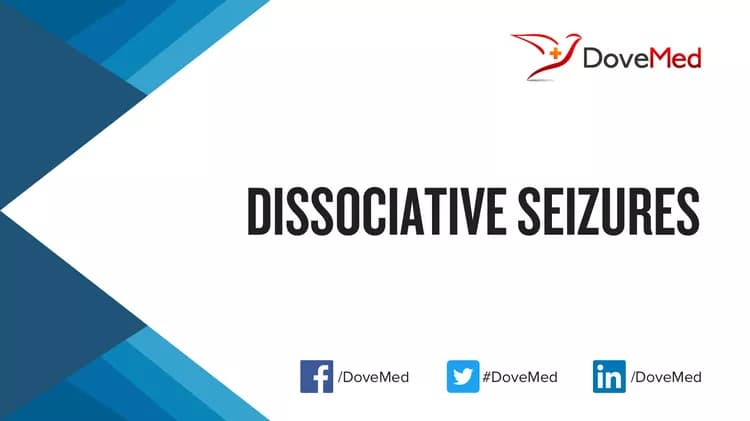What are the other Names for this Condition? (Also known as/Synonyms)
- Functional Seizures
- Non-Epileptic Attack Disorder (NEAD)
- Psychogenic Nonepileptic Seizures (PNES)
What is Dissociative Seizures? (Definition/Background Information)
- Dissociative Seizures or Psychogenic Nonepileptic Seizures (PNES) are involuntary episodes of movement, sensation, or behaviors (vocalizations, crying, and other expressions of emotion) that do not result from abnormal brain discharge
- The seizures can look like any kind of epileptic seizure. They are somatic manifestations (physical symptoms) of psychological distress
- Psychiatric conditions associated with PNES include depression, anxiety, somatoform disorder, posttraumatic stress disorder, dissociative disorder, and personality disorders
- The treatment of Dissociative Seizures depends on the cause of the psychologic distress, and may involve cognitive behavioral therapy or psychotherapy, as well as antidepressant medication
(Source: Dissociative Seizures; Genetic and Rare Disease Information Center (GARD) of National Center for Advancing Translational Science (NCATS), USA.)
Who gets Dissociative Seizures? (Age and Sex Distribution)
- Dissociative Seizures is a rare disorder. The presentation of symptoms may occur at any age
- The condition can occur during a traumatic experience, or up to several years after the experience has occurred
- Although both genders are affected, females are more prone to the disorder
- Worldwide, individuals of all racial and ethnic groups may be affected
What are the Risk Factors for Dissociative Seizures? (Predisposing Factors)
The risk factors for Dissociative Seizures may include:
- Female gender
- Any emotionally stressful situation
- Physical trauma
- A situation that reminds an individual of a past trauma
- Extreme stress
- Having some form of psychological disorders such as depression and anxiety
It is important to note that having a risk factor does not mean that one will get the condition. A risk factor increases one’s chances of getting a condition compared to an individual without the risk factors. Some risk factors are more important than others.
Also, not having a risk factor does not mean that an individual will not get the condition. It is always important to discuss the effect of risk factors with your healthcare provider.
What are the Causes of Dissociative Seizures? (Etiology)
- Dissociative Seizures are caused by traumatic events, which can trigger a “dissociative” or unconscious response to that event
- Some conditions that are known to cause Dissociative Seizures include:
- A death of a close friend or close relative
- An abusive relationship
- Relationship break-ups
- Post-traumatic stress disorder
- Pre-existing psychological disorders in combination with a stressful situation
What are the Signs and Symptoms of Dissociative Seizures?
The signs and symptoms of Dissociative Seizures may include:
- Rapid heartbeats
- Sweating
- Dry mouth
- Inattentiveness to immediate surroundings
- Loss of control over movement
- Loss of control over spoken words
- Crying
- Hyperventilation
- Convulsions
How is Dissociative Seizures Diagnosed?
Dissociative Seizures is diagnosed on the basis of the following information:
- Complete physical examination
- Thorough medical history evaluation
- Assessment of signs and symptoms
- Psychiatric assessment(s)
- Laboratory tests
- Imaging studies
- Biopsy studies, if necessary
Many clinical conditions may have similar signs and symptoms. Your healthcare provider may perform additional tests to rule out other clinical conditions to arrive at a definitive diagnosis.
What are the possible Complications of Dissociative Seizures?
The complications of Dissociative Seizures may include:
- Loss of consciousness
- Risk of injury to self and others
- Inability to cope with trauma
Complications may occur with or without treatment, and in some cases, due to treatment also.
How is Dissociative Seizures Treated?
The treatment for Dissociative Seizures depends on the cause of the psychologic distress, and may involve:
- Cognitive behavioral therapy or psychotherapy
- Antidepressant medication
(Source: Dissociative Seizures; Genetic and Rare Disease Information Center (GARD) of National Center for Advancing Translational Science (NCATS), USA.)
How can Dissociative Seizures be Prevented?
- Dissociative Seizures may be preventable, if an affected individual is able to recognize the warning signs or triggers before an episode, and seeks medical and/or psychological help (for coping mechanisms)
- Active research is currently being performed to explore the possibilities for treatment and prevention of disorders such as Dissociative Seizures
- Regular medical screening at periodic intervals with tests and physical examinations are recommended
What is the Prognosis of Dissociative Seizures? (Outcomes/Resolutions)
- The prognosis of Dissociative Seizures is dependent upon the severity of the signs and symptoms and associated complications, if any
- Individuals with mild conditions have better prognosis than those with severe symptoms and complications
- Typically, the prognosis may be assessed on a case-by-case basis
Additional and Relevant Useful Information for Dissociative Seizures:
The following are some additional synonyms for Dissociative Seizures:
- Pseudoseizures
- Psychogenic Non-Epileptic Seizures (PNES)
- Psychogenic Seizures
The following DoveMed website link is a useful resource for additional information:
Related Articles
Test Your Knowledge
Asked by users
Related Centers
Related Specialties
Related Physicians
Related Procedures
Related Resources
Join DoveHubs
and connect with fellow professionals


0 Comments
Please log in to post a comment.